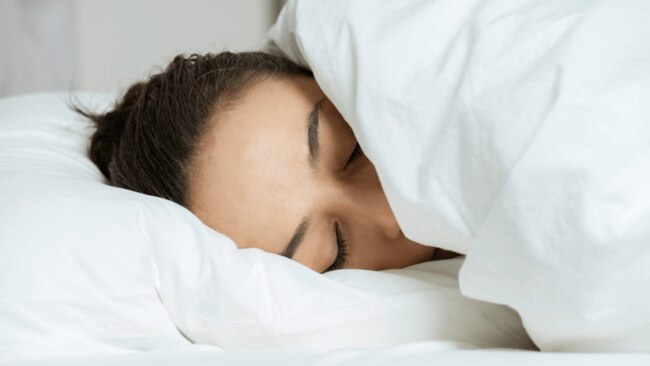Do you wake up exhausted? You could have 'hyper-fatigue'
It's more than just a lack of sleep

Lifestyle
Don't miss out on the headlines from Lifestyle. Followed categories will be added to My News.
If you wake up feeling depleted – even after a good night’s sleep – this little-known condition could be behind it. Here’s what experts say, and how you can help boost your energy.
Sometimes life can feel like one giant hamster wheel: racing to catch up on neverending task lists, constantly worrying about workloads and throwing all our hard-earned cash towards utility bills and the rent/mortgage. It’s no surprise that the nation is experiencing a wave of exhaustion, with 2023 being dubbed the ‘year of hyper-fatigue’.
I’m the least likely person to slump with an energy crash, but in recent weeks I’ve been hit by unexpected bouts of the heavy-limbed, low-mood lethargy that’s hard to overcome. It’s taken more than the usual effort to haul myself through the day.
And I’m not alone. When I ask other people how they are, an increasing number respond with “shattered”. I don’t think sleep is the issue for me – I get plenty – but there’s nothing I can put my finger on, no identifiable trigger that is causing the waves of weariness.
Like what you see? Sign up to our bodyandsoul.com.au newsletter for more stories like this.
Experts say hyper-fatigue is neither the chronic fatigue associated with fluctuating hormones or underlying illness, nor the everyday tiredness that passes with a few good nights’ sleep, but rather a mid-point of exhaustion, the consequence of unprecedented drains on our inner batteries.
Matthew Apps, an associate professor in the school of psychology at the University of Birmingham, who’s researching fatigue and its effects, says it’s a consequence of being stretched and strained in so many directions, with pressures such as the cost-of-living crisis and the difficulty of managing work-life balance.
“We’re now in this post-pandemic bounce-back phase and, even over the last two months, there seems to have been a big upswing in people taking on more tasks, requests and invitations for work and social events than they have over the last couple of years,” says Apps. “It can result in a kind of chronic, low-level stress that leads to feelings of fatigue and can impact our motivation to do things, so we feel even more lethargic.
“It’s often assumed that a lack of sleep is the reason, but fatigue is impacted by lots of different things and sleep is just one of them,” adds Apps.
It’s also hard to quantify, even for scientists. “The problem with fatigue is it’s a slippery concept,” says Derek Hill, professor of medical imaging science at University College London. “Twenty years ago, no researchers were thinking about finding ways to help people deal with fatigue,” he says. “But it can become an issue that impacts people’s lives and it’s now finally being taken seriously.” In the meantime, here’s what we know about hyper-fatigue and the best ways to get your mojo back.

How do you know when you're hyper-fatigued?
Tiredness is highly subjective – one person’s mild weariness is another’s hyper-fatigue. Psychologists use screening tools such as the Epworth Sleepiness Scale to assess concerning levels of fatigue, but “nobody’s experience of fatigue can be neatly quantified in a 20-question survey,” says Hill. With only rudimentary measurements to assess fatigue available, it eventually comes down to internal self-scrutiny.
“I tell people that if the things they would normally do to reboot their energy levels – such as massage, sleep, exercise, socialising – are no longer working, then it’s a sign you’re overtired,” says Apps. “For example, I’m generally a poor sleeper so I’m used to feeling a little bit groggy most mornings, but if I were to feel beyond that level of exhaustion for a prolonged period, I would start to feel concerned.”
But when should you see a doctor?
If tiredness persists for several weeks and starts to impact your life, speak to your doctor. Reason? It could be telling you something important about your body or brain. Hill suggests that should happen “when fatigue interferes with everyday living and it isn’t just waking up feeling exhausted for a couple of days in a row, but for a few weeks.”
Blood tests might be needed to determine whether a nutrient deficiency or other underlying issue could be the culprit. Unexplained fatigue is a symptom of depression, but could also be associated with alcohol intake, undiagnosed sleep apnoea or a more serious long-term illness.
A 2020 study at the University of Massachusetts Amherst revealed that fatigue is a symptom for 40 to 74 per cent of people living with chronic illness, such as heart disease, cancer, rheumatoid arthritis and neurological illnesses. “It might be none, one or more of these, or related to a chronic build-up of stress,” Apps says.
The bottom line: don’t ignore it, and call your GP.

Is more sleep the answer?
Sleep is restorative and, governed by our body’s circadian rhythms, allows us to replenish energy stores. It’s a no-brainer that you should get more if you regularly fall well below seven hours a night. “We know that in people who sleep less than optimally, there are changes in patterns of parts of the brain that make you feel more fatigued,” explains Apps.
“If we’re sleep deprived, it has a carryover effect that threatens our mental and emotional wellbeing,” explains Australian sleep expert, Olivia Arezzolo. However, for people with longer-lasting fatigue, a lack of sleep is rarely the single root cause of their tiredness. “While sleep is important to restore energy, so is rest in other forms: from work, from socialising, from strict routines and regimes,” she says.
A short nap of 20 to 30 minutes can help you to feel more energised, but nap for longer and you’re likely to hit sleep inertia, that horrible grogginess on waking that can make you feel even more tired.
Will regular exercise help?
Sedentary lifestyles are certainly implicated in rising levels of fatigue, partly because of their links to low-level inflammation in the body – which researchers suggest can also contribute to people feeling tired or lethargic all the time.
On the flip side are regular exercisers who might need to scale back. “When people think about fatigue, they think exercise will help to raise energy levels,” says Hill. “That’s certainly the case for some people, but for others, more physical activity can actually make things worse.”
In Apps’ studies he’s shown that the brain processes physical and mental fatigue in the same way, and that both can result in a downturn in motivation. “Too much exercise, with too little time for recovery, will adversely impact how tired you feel,” he advises. “If you’re too exhausted to do anything else, then you are exercising too much.”

Could food or diet be the culprit?
Eating too much sugar and salt, as well as too many refined foods, are likely to affect energy levels over time. “It won’t necessarily impact fatigue levels directly, but it can lower your mood, which in turn affects your motivation to do things, and that brings about fatigue,” says Apps.
Low levels of some specific vitamins and minerals could be at play, too. Too little vitamin D, for example, can lead to “unexplained fatigue” in some people. Quick explainer: the body produces vitamin D when skin is exposed to sunlight, and there are few natural food sources – although dairy products, oily fish, cod liver oil and eggs contain some.
Check iron levels, too. Iron is found in red meat, poultry, seafood and fish, eggs, bread, beans, pulses and green, leafy vegetables and seeds, but too little can leave you feeling overwhelmingly tired and breathless. Your GP can refer you for a blood test to check for iron-deficiency anaemia, usually treated with a course of supplements.
While there’s no magic bullet for hyper-fatigue, it’s definitely fixable. Better still, most (if not all) of the solutions have fantastic knock-on effects in other areas of your health. And who wouldn’t want a little piece of that, along with a spring in their step?
More Coverage
Originally published as Do you wake up exhausted? You could have 'hyper-fatigue'




